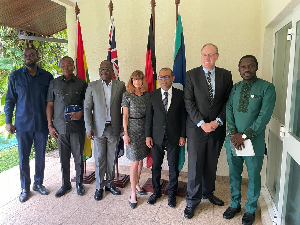 Seidu Issifu (3rd from left) with the team
Seidu Issifu (3rd from left) with the team
In a momentous dialogue that signals a renewed commitment to tackling the global climate crisis, H.E. Berenice Owen-Jones, the Australian high commissioner to Ahana, convened a vital round table discussion dedicated to climate change and sustainability.
This gathering brought together pivotal figures, including Daniel Featherston, the Counsellor for Climate Change at the Australian High Commission, and Candice Hooper, the second secretary and consul, alongside the Honorable Seidu Issifu, Ghana's minister of state in charge of climate change and sustainability. Notably, the discussion also featured H.E. Mohamed Nasheed, Secretary General of the Climate Vulnerable Forum (CVF) and V20 Secretariat, enriching the conversation with his global insights.
A Collaborative Agenda for Climate Innovation
The agenda of the meeting included several critical points aimed at fostering collaboration and developing strategies to combat climate change:
1. Introduction of Australia’s International Engagement on Climate Change: The discussion began with an overview of Australia's commitment to international cooperation on climate issues, highlighting its leadership and innovative approaches.
2. Priorities of Ghana and CVF-V20 on Climate Change: Ghana's priorities in addressing climate change were spotlighted, emphasizing the urgency and relevance of climate action in the nation’s development agenda.
3. Discussion on Climate Prosperity Plan: The participants exchanged ideas on implementing Climate Prosperity Plans that align economic growth with environmental sustainability, exploring pathways for a resilient and prosperous future.
4. Introduction to Debt for Renewable Energy Swap Proposal: A novel proposal aimed at restructuring debt in a way that fosters investment in renewable energy projects was introduced, setting the stage for transformative financial solutions.
Outcomes of the Meeting
The round table resulted in several key outcomes:
- Enhanced Knowledge-Sharing and Networks: All parties left with a strengthened understanding of each other’s priorities in climate change, paving the way for enhanced collaboration.
- Improved Mutual Understanding: The dialogue facilitated a deeper appreciation of Ghana and Australia's respective climate change strategies and goals.
- Increased Understanding of CVF Partnerships: The meeting underscored the importance of partnerships for climate resilience, positioning the CVF as a pivotal player in the global climate landscape.
- Policy Recommendations: Participants outlined actionable policy recommendations for government and stakeholders, guiding future discussions and initiatives.
Insights from the Discussion
H.E. Berenice Owen-Jones declared that the appointment of Ghana's Minister for Climate Change and Sustainability marks a significant milestone in the nation's climate agenda. She emphasized the potential for small grants facilities and partnership opportunities, particularly in agriculture and investment in agricultural research aimed at benefiting smallholder farmers. The High Commissioner also highlighted Australia's expertise in renewable energy, which can be invaluable to Ghana’s climate efforts, alongside a wealth of high-level data available to support climate change solutions.
The Minister of State, Hon. Seidu Issifu, reiterated President John Dramani Mahama’s seriousness in addressing climate change issues, noting the government's high-level focus and commitment to sustainable practices.
Daniel Featherston underscored Australia’s enthusiasm to host COP31, expressing the hope for enhanced partnerships with Ghana and other African nations to ensure the success of the conference, marking a pivotal moment for global climate governance.
H.E. Mohamed Nasheed reflected on the potential of Africa, asserting that the continent serves as the “lungs of the earth” with significant capacity to spearhead the green transition agenda. His remarks reinforce the notion that Africa is crucial to global climate solutions, not just as a participant but as a leader in innovative sustainability efforts.
Conclusion
The round table discussion between Australian and Ghanaian officials signifies a robust commitment to collaborative climate action, spearheaded by mutual understanding and shared goals. With Australia gearing up to host COP31, the partnerships forged in this meeting lay a strong foundation for impactful climate initiatives that can resonate across continents. The road ahead is one of innovation, resilience, and shared responsibility towards a sustainable future.